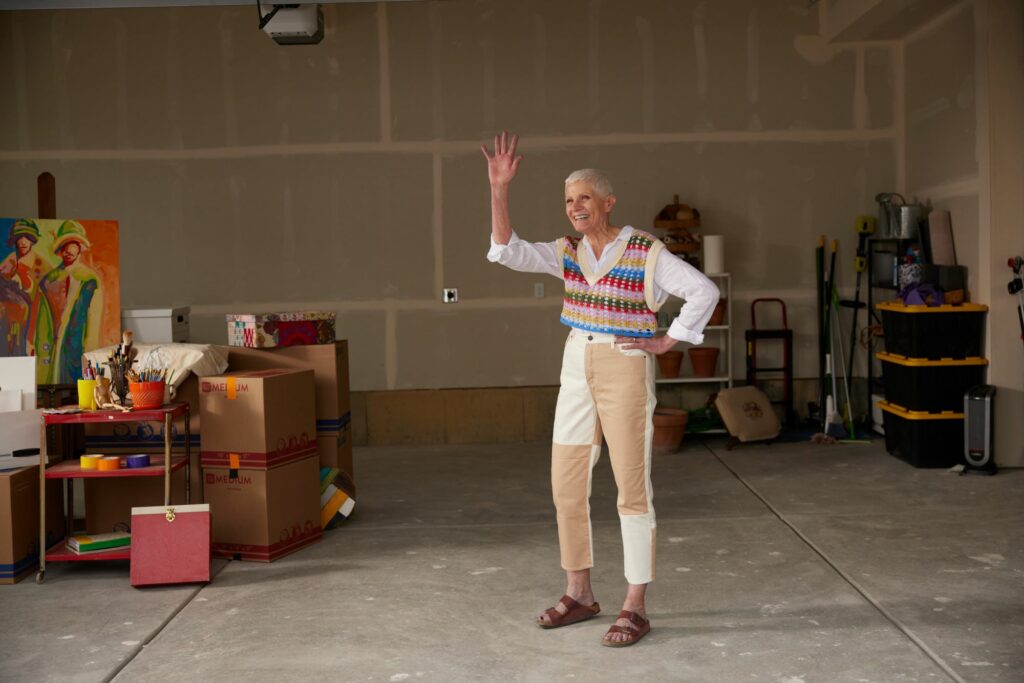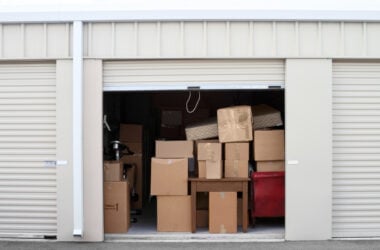“Are storage units safe?” It’s a question that comes to mind when storing our valuables away from home (especially collectibles and sentimental items, like photos).
Considering the break-in rates of traditional storage facilities (and who is held liable when things go awry. Hint: it isn’t the storage facility), concerns about the safety of your belongings and the risk of potential damage are justified.
However, your response to these pre-storage jitters shouldn’t be to rule out self-storage completely. You’ll just need to pre-screen your storage facility of choice before signing a rental contract. While traditional self-storage units are often the go-to storage option, peer-to-peer storage options (like Neighbor, the cheaper, closer, and safer storage marketplace) are rated the safer option.
If you plan to rent a traditional storage unit (despite the risks involved), you’ll want to take the following measures to ensure your items stay protected.
Understanding the Risks of Using a Self-Storage Unit
While renting a traditional storage unit (over a peer-to-peer storage option) can seem like a secure way to store your belongings, there are several potential risks to be aware of during this self-storage process:
Rain Damage
When it comes to storing your stuff, rain can be a real problem. If the storage unit’s structure is compromised, rainwater can find its way in and damage your items.
For example, a leaky roof during a rainstorm can harm your belongings from above, and water may also enter from below due to rising groundwater or an overflowing sump pump.
Protect your stored items by choosing a unit with a sturdy roof and adequate drainage systems. To do so, consult your storage facility about previous flooding and the preventative measures taken against flood-related damage.
Additionally, consider elevating your items off the ground to minimize the risk of water damage.
Mold or Mildew
Moisture is a silent enemy of stored items, even in the absence of heavy rainfall or flooding.
Storage units lacking climate control features, such as air conditioning, can become breeding grounds for mold and mildew. These fungi can wreak havoc on your possessions, causing irreversible damage.
To combat this threat, opt for climate-controlled self-storage units that regulate humidity levels and keep mold and mildew at bay.
Properly packaging your items with moisture-resistant materials can also provide an added layer of protection.
Fire Hazards
One of the foremost concerns in storage facilities is the risk of fire. While these facilities typically have stringent rules against storing flammable items, the possibility of a fire can’t be entirely ruled out.
To minimize this risk, storage facilities invest in fire prevention measures. Regular inspections should be conducted to identify potential fire hazards promptly. Also, storage facility staff members should be trained to respond swiftly in an emergency.
Negligence
The well-being of your stored items isn’t solely dependent on the weather. Neglect on the part of storage facility managers can result in major issues with your items.
Failure to address pest infestations, like rodents or insects, may result in unwelcome critters entering your unit and damaging your belongings. Confirm that the storage facility takes adequate pest control measures.
If the facility has Insufficient security measures in place, theft can be a possibility, Because renters are responsible for the well-being of their items (and the storage unit itself), you’ll want to look for storage providers that prioritize security, offering features like surveillance cameras, gated access, and on-site staff presence.
Be on the lookout for facilities that don’t have don’t any security measures in place.
Security Concerns
While some facilities may have limited security measures and disclaim responsibility for theft, that doesn’t mean security breaches are inevitable.
Our actions as renters can reduce the risk of our storage units becoming targets for theft. If you don’t take the necessary security measures, you could put your belongings (e.g., sensitive items like legal documents) at greater risk. So, staying proactive is key to keeping your stored items safe.
What To Look For In A Storage Unit?
Selecting the best storage unit is important to keep your belongings secure and well-maintained. Let’s explore the key factors to consider when choosing a storage unit:
Digital Surveillance
When it comes to security, go for a storage unit that’s equipped with a modern 24-hour digital surveillance camera. Unlike old-school videotape systems, these cameras boast superior video quality and reduced gaps in coverage.
Look for facilities with security cameras that are strategically placed throughout the entire facility, not just at the entrance. Another good security measure is a keypad entry system with unique access codes to keep out unauthorized folks.
Climate Control
If you live in a place prone to humidity, it’s smart to pick a storage unit with climate-controlled features. This feature helps prevent mold from building up and maintains the condition of your stored stuff.
If you’re storing items sensitive to temperature changes, spending the extra on climatized self-storage is a small price to pay for moisture-damage-free storage.
Look for a Well-Kept Place
You want a storage facility that’s well-maintained and closely monitored. If you spot broken fences or locks, chances are that potential thieves might spot them, too.
Before renting with a facility, ask to see their pest control plan and inspect the unit for potential sources of leaks, which may lead to water damage down the road.
Strategies for Keeping Storage Units Safe
It doesn’t matter if you’re storing household items, business supplies, or little moments. You’ll want these items to stay secure.
With a few simple strategies, you keep your stored items safe and sound. From picking the right storage unit to adding some extra security features, there are ways to ward off self-storage thieves.
Chicken Wire
A tried-and-true strategy for protecting the contents of your storage unit is to make your stuff hard to get to (or make it look like it’s not valuable). Chicken wire, for example, serves as a physical barrier that makes it more difficult for robbers to swipe your valuables.
Because an intruder will need to overcome the hurdle of chicken wire before accessing your items, this simple addition to your storage space can successfully repel thieves.
In most cases, a thief hunting for high-value items will look for the path of least resistance.
Find an Uncuttable Lock
There are cylinder locks that don’t have an accessible bolt to cut and are, therefore, harder to break into. While no lock is entirely foolproof, choosing one of these padlocks can significantly reduce the theft risk.
Place a Hidden Internal Lock
With lock cutting earning a spot as the most common form of self-storage burglary, some renters find (or install) an additional securing point inside the door, one they can reach through a small gap after unlocking the padlock. Robbers unaware of this extra safety measure, even after breaking through the first lock, will find themselves at a standstill.
Remember, any visible chain or bolt can be cut.
Set Up Battery-Powered Internal Security
For those storage unit renters who want to go above and beyond with storage space security, consider setting up Wi-Fi or battery-powered internal security.
Depending on how much you want to spend (and the total value of the belongings stored in your unit), you can invest in local surveillance, cloud surveillance, alarm systems, and triggered physical security measures.
Keeping Yourself Safe in a Storage Facility
Knowledge is your best ally when it comes to being safe at a storage facility. Keep these tips in mind for keeping yourself and your storage units safe:
Visit During the Day
Do not visit storage facilities at night, especially outdoor garage facilities. Make sure your unit is always in a well-lit area and stay out of deeply shadowed or poorly maintained spaces.
Always Bring a Friend
The safest way to go to any personal storage unit is with a friend or a group. Not only does this make it easier to manage your stored items, but it also lowers the risk of any unpleasant encounters with strangers.
Know Your Alternatives to a Storage Unit

If you’re worried that your best efforts won’t be enough to deter security breaches, consider alternatives to traditional storage units:
- Storing your belongings at a family member or friend’s house
- Extended truck rentals
- Peer-to-peer storage (e.g., Neighbor.com)
Some people can sidestep the need for storage facilities during a move by extending their truck rental by a few extra days. But this margin is small and potentially expensive.
A go-to alternative is storing your belongings with a family member or friendly neighbor who has extra space in their garage, unfinished basement, or spare room. Consider the trade-up in safety should you choose to store with a trusted friend, family member, or neighbor instead of a big corporate entity like a traditional storage unit facility.
Residential garages are rarely hotspots for crime. Homes and open commercial storage spaces are less likely to be targeted for theft than personal storage units. The only real problem has been connecting people who have open space with those who need it. That is, until the sharing economy.
Through peer-to-peer marketplaces like Neighbor.com, you can find residential storage spaces that promise higher security than traditional self-storage units. Peer-to-peer over traditional is a safe and convenient way to keep your belongings safe and close to home while ensuring their security.
CTA
Looking for safe and affordable storage options in your community? Discover the perfect storage facility with Neighbor, a peer-to-peer self-storage marketplace. Visit Neighbor’s Personal Storage Near Me to explore various secure storage solutions today! Why settle for less when you can store with Neighbor?







